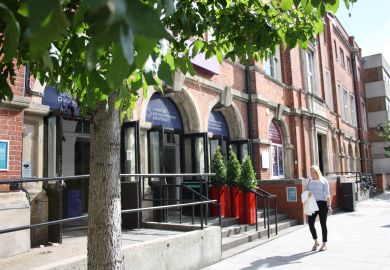Lynn Dobbs’ final fortnight at London Metropolitan University came with a sting in the tail: an improvement notice from the Office for Students highlighting what it saw as lower than expected continuation and completion rates.
“I think we were 1 per cent below the required completion rate,” said Professor Dobbs, who is retiring from the north London institution she has led since October 2018.
“But the metrics that they use are quite contentious,” she reflected on the much-discussed B3 student success benchmarks, which state that London Met should see 75 per cent of full-time, first-degree students graduate (74 per cent did so, according to the OfS).
“These are flawed indicators, and it is never said where they come from – they aren’t contextualised and the data is so old too,” added Professor Dobbs on the report’s discussion of data going back as far as 2016, often on long-shuttered courses.
Given that more recent internal data on continuation are “improving” while London Met achieved “remarkably good” results in the latest National Student Survey, plus a gold rating for student experience in the Teaching Excellence Framework, Professor Dobbs wondered why the OfS pressed on with its blunt audit method.
“I’m not sure why it’s taken this approach – numerically other institutions are comparable to us, but they were not scrutinised,” she said.
More broadly, these benchmarking exercises fail to properly account for the complex challenges faced by London Met students, of whom 70 per cent come from the highest two deciles of deprivation, said Professor Dobbs.
“People sometimes say London Met should recruit better students, but if someone had applied this right-wing approach to me, I’d have never been accepted to university,” she reflected.
Similar to many London Met students, Professor Dobbs worked while studying politics at Newcastle University in the early 1990s. “I was 33, had a full-time job running the tourist office, a baby and a toddler when I decided to study at Newcastle. I loved being a student – when I walked into class I was bouncing,” she recalled, adding that she received the “highest first-class degree ever awarded” in her subject at the institution.
Not every London Met student will hit those academic heights, but Professor Dobbs is fiercely proud not just of her university’s employment outcomes but also of her institution’s wider influence. “When students arrive, they are loud and not always terribly well behaved – I’m generalising a bit – but, as time goes by, students grow and become thoughtful, well-rounded citizens. Their degrees will serve them well, but that bigger change is also important,” she said.
Over the past academic year, London Met has been in the unusual situation of hiring many more staff – 80 academics and 70 in professional services – as student numbers rebounded after years of decline. “We have gone up from about 8,000 students on campus to 14,000, so we needed those staff,” explained Professor Dobbs.
That growth has included a significant increase in international students, with revenues from this source growing from £7.9 million in 2021-22 to £29.5 million in 2022-23. This exceptional result – representing almost a quarter of London Met’s annual income – has not been massively hit by recent student visa restrictions that have hurt other universities, insisted Professor Dobbs, who reported a “slight increase” in this year’s overseas recruitment.
“We would be flying if the visa changes hadn’t come in – international students have been really receptive to London Met,” she explained.
Recent success in student recruitment is vital because the subsequent income allows the university to invest in other priority areas, she continued. “We’ve done remarkably well on the KPIs that we set ourselves – hitting 19 out of 20 – but the two most important were growing income and managing a surplus, because you cannot do anything else without achieving these,” said Professor Dobbs.
Not everyone will be delighted to see London Met drag itself out of a decade-long financial quagmire by growing its international student numbers. (Domestic student numbers have grown, too, but the university loses £3,000 per year for each student, said Professor Dobbs.) Conservative leadership candidate Robert Jenrick has repeatedly flagged the rapid growth in overseas numbers at “ex-polytechnics” as a cause for concern, claiming that some students see their degrees “as little more than a back door to working in the UK”.
For her part, Professor Dobbs struggled to see why London Met’s overseas students filling vacancies was problematic. “We have shops and restaurants on Holloway Road that cannot open because they can’t get enough staff. These students also spend a huge amount of cash, usually in the night-time economy or small local shops,” said Professor Dobbs, who recently spoke to Labour’s new education secretary, Bridget Phillipson, about this issue.
“To hear her say that international students are welcome and the graduate route will stay was pleasing,” said Professor Dobbs, who welcomed what she saw as a reset in relations with the sector. “I spoke to Bridget before the election and said, ‘Whatever you do, let’s have a partnership – not the constant changes in government policy and fairly aggressive relationship established by the last government.’”
Having been at the sharp end of government policy for nearly six years, Professor Dobbs – who was stepping aside earlier than planned after deputy vice-chancellor Julie Hall was appointed her successor – admitted that she was looking forward to not stressing over what might come next. “Whenever the government was announcing a policy, I’d be nervous. I don’t need to worry about those things now I’m retiring – it’s one thing that I won’t miss.”
Register to continue
Why register?
- Registration is free and only takes a moment
- Once registered, you can read 3 articles a month
- Sign up for our newsletter
Subscribe
Or subscribe for unlimited access to:
- Unlimited access to news, views, insights & reviews
- Digital editions
- Digital access to THE’s university and college rankings analysis
Already registered or a current subscriber?








